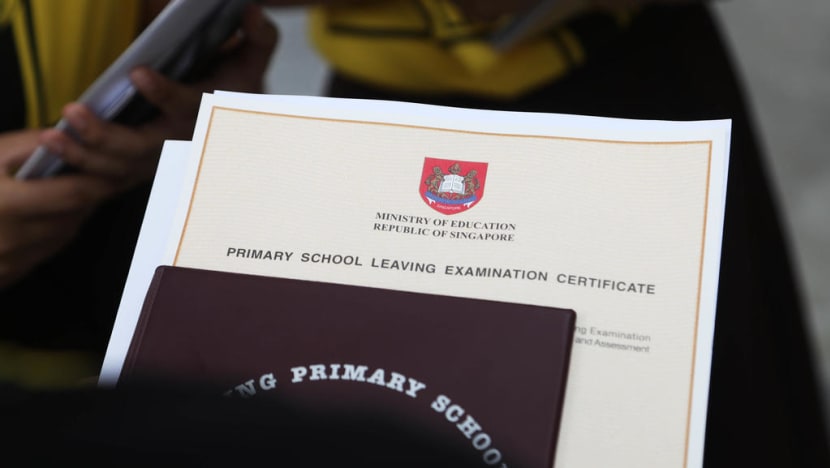Commentary: Killer PSLE questions can haunt students long after primary school
Students with traumatic PSLE experiences can develop test anxiety or self-doubt that persists into adolescence and even adulthood, says psychiatrist Dr Lim Boon Leng.


This audio is generated by an AI tool.
SINGAPORE: Thousands of anxious Primary 6 students will be collecting their Primary School Leaving Examination (PSLE) results on Tuesday (Nov 25). While waiting, some students may be wondering whether the killer questions that stumped them affected their scores.
The Ministry of Education has stated that about 15 per cent of PSLE questions are intentionally challenging so that higher-ability students can be assessed correctly. On paper, that may seem modest. In practice, these questions can shape a child’s entire emotional experience of PSLE and of examinations in general.
As a psychiatrist, I’ve seen clients who’ve been affected by the long tail of PSLE stress. An undergraduate I spoke with could vividly recount a single question on the PSLE Mathematics paper. “I still remember Jess and the ribbons,” she said, referencing the 2017 “ribbon” question where Jess needed 200 ribbons of 110cm each, and the rolls came in 25m tapes.
Caught between converting units, counting ribbons per tape, and deciding whether to round up or down, she panicked. The rest of the paper spiralled out of control. Maths had always been her best subject, yet that day she walked away with a worse grade than her prelims and the belief that she was lousy in maths.
Her example encapsulates how just one complex question under pressure can erode confidence, even in high-achieving children.
DEVELOPING BRAINS
To understand why these “killer questions” loom so large, we need to recognise that 12-year-olds are neurologically unfinished. Their prefrontal cortex, which is responsible for decision-making, planning, impulse control and emotional regulation, is still undergoing active construction.
The far-from-mature brain explains why Primary 6 students would struggle with challenging questions, particularly complex ones that need strategic thinking or high-level problem-solving. Expecting them to demonstrate composure, reasoning and speed under exam stress may be ambitious and unfair.
Students with certain conditions are particularly vulnerable in high-pressure exam settings. An estimated 5 per cent to 8 per cent of school-age children have attention deficit hyperactivity disorder (ADHD), and 3 per cent to 10 per cent of students have dyslexia.
Students with ADHD may have difficulties with concentration and time management, and would tend to falter with complex questions under timed conditions. Those with dyslexia, who process language more slowly even when comprehension can be strong, would likewise suffer.
Children with anxiety tendencies are especially sensitive. When a difficult question triggers their stress response, their working memory can collapse, leaving them momentarily unable to think clearly, even if they know the content.
This problem is not hypothetical. Research in developmental neuroscience consistently confirms that acute stress impairs executive functions such as working memory, cognitive flexibility and attention – precisely the skills needed to handle novel problems.
The killer questions can inadvertently punish students even if they possess exceptional creativity, intelligence or long-term potential.
In any case, if the child’s difficulty is not in understanding the concepts but in filtering noise and managing anxiety, then killer questions are measuring the wrong construct. It is assessing neurological maturity under stress, not cognitive potential.
PSYCHOLOGICAL CONSEQUENCES
Parents often believe children “bounce back quickly”. Yet from what I see personally and clinically, PSLE can leave enduring emotional marks. Students with traumatic PSLE experiences can develop test anxiety or self-doubt that persists into adolescence and even adulthood.
A secondary school boy told me he still feels waves of dread and fear whenever tests approach, tracing it back to the PSLE moment when he froze on the challenging questions and underperformed.
A single baffling question can become a trigger that derails an entire exam. The cognitive error that is internalised thereafter can be damaging and long-lasting: “I’m a failure because I can’t solve this.”
Surely a student-centric system that values calm resilience should nurture it, not test it under pressure.
A KINDER, SMARTER ASSESSMENT
Some will argue that life is tough and children must learn to handle difficulties. It is true that resilience is forged through adversity. However, real resilience grows when students are supported in their struggles, and can recover should they fail.
No one is arguing for a softer society, and rigour remains essential, but we can surely design smarter assessments and have kinder calibrations. The late bloomer is not a myth but a developmental reality.
To help us determine the usefulness of PSLE, we would need data on how exam performance correlates with long-term outcomes – not only academic outcomes like university admission rates, but also psychological outcomes such as impact on lifelong learning.
Early detection, intervention and easier access to structured accommodations for neurodivergent learners and anxious students will help to ensure equity. We can retain standards without inflicting unnecessary psychological damage.
The PSLE is not just a test but also a mirror of national values. It reflects how Singaporean society defines ability, success and most importantly, fairness.
If 15 per cent of questions are deliberately challenging, then the harder task for us adults is ensuring that our systems are attuned not only to academic ability, but to human potential in all its varied, messy and developing forms.
Dr Lim Boon Leng is a psychiatrist at the Gleneagles Medical Centre.













